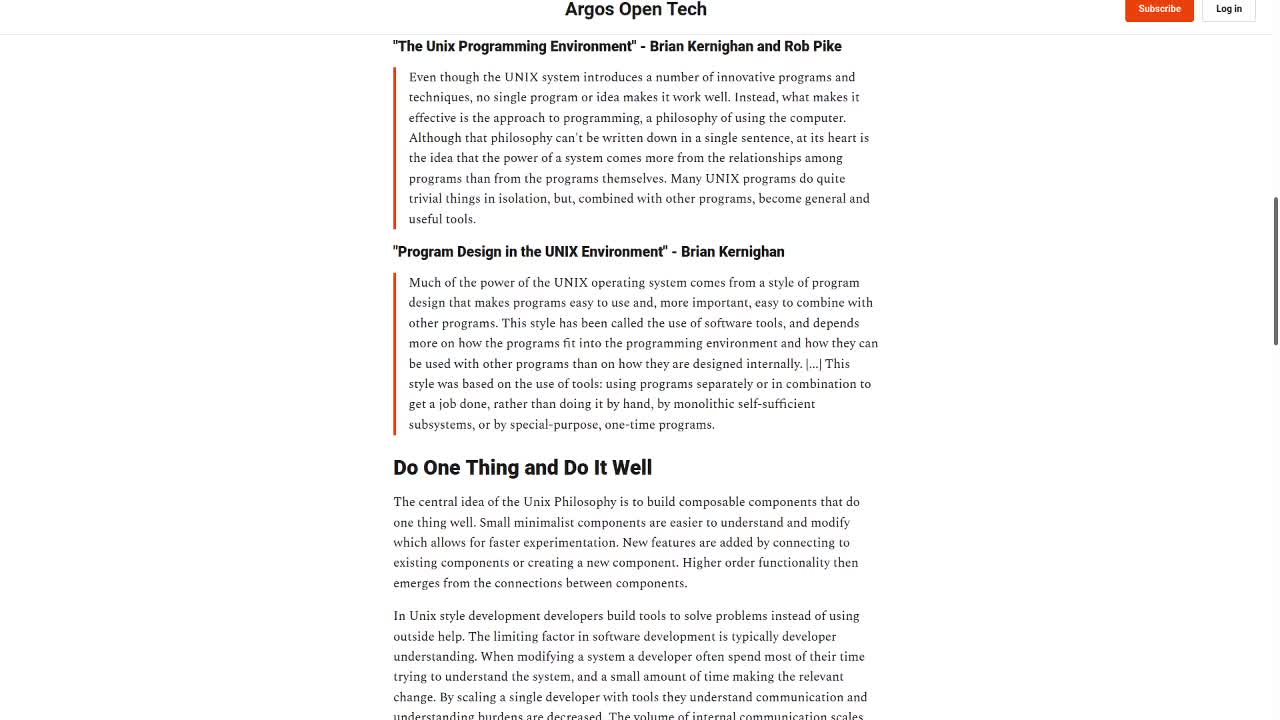Premium Only Content

The Unix Philosophy
The Unix Philosophy
The Unix Philosophy is a system design philosophy of using minimalist composable components.
As a software development style the Unix Philosophy advocates building small tools that communicate over a universal interface to create larger systems. Higher level functionality then emerges from the combination of these composable tools instead of from a monolithic program.
Formulations
Peter Salus
Write programs that do one thing and do it well.
Write programs to work together.
Write programs to handle text streams, because that is a universal interface.
Doug Mcllroy
Make each program do one thing well. To do a new job, build afresh rather than complicate old programs by adding new "features".
Expect the output of every program to become the input to another, as yet unknown, program. Don't clutter output with extraneous information. Avoid stringently columnar or binary input formats. Don't insist on interactive input.
Design and build software, even operating systems, to be tried early, ideally within weeks. Don't hesitate to throw away the clumsy parts and rebuild them.
Use tools in preference to unskilled help to lighten a programming task, even if you have to detour to build the tools and expect to throw some of them out after you've finished using them.
This is the Unix philosophy: Write programs that do one thing and do it well. Write programs to work together. Write programs to handle text streams, because that is a universal interface.
The notion of "intricate and beautiful complexities" is almost an oxymoron. Unix programmers vie with each other for "simple and beautiful" honors — a point that's implicit in these rules, but is well worth making overt.
"The Unix Programming Environment" - Brian Kernighan and Rob Pike
Even though the UNIX system introduces a number of innovative programs and techniques, no single program or idea makes it work well. Instead, what makes it effective is the approach to programming, a philosophy of using the computer. Although that philosophy can't be written down in a single sentence, at its heart is the idea that the power of a system comes more from the relationships among programs than from the programs themselves. Many UNIX programs do quite trivial things in isolation, but, combined with other programs, become general and useful tools.
"Program Design in the UNIX Environment" - Brian Kernighan
Much of the power of the UNIX operating system comes from a style of program design that makes programs easy to use and, more important, easy to combine with other programs. This style has been called the use of software tools, and depends more on how the programs fit into the programming environment and how they can be used with other programs than on how they are designed internally. [...] This style was based on the use of tools: using programs separately or in combination to get a job done, rather than doing it by hand, by monolithic self-sufficient subsystems, or by special-purpose, one-time programs.
Do One Thing and Do It Well
The central idea of the Unix Philosophy is to build composable components that do one thing well. Small minimalist components are easier to understand and modify which allows for faster experimentation. New features are added by connecting to existing components or creating a new component. Higher order functionality then emerges from the connections between components.
In Unix style development developers build tools to solve problems instead of using outside help. The limiting factor in software development is typically developer understanding. When modifying a system a developer often spend most of their time trying to understand the system, and a small amount of time making the relevant change. By scaling a single developer with tools they understand communication and understanding burdens are decreased. The volume of internal communication scales O(n3) with the number of developers while their surface area of useful work with the outside world scales O(n2). The modularity and composibility of the Unix Philosophy increases what individual developers can accomplish and makes it easier for developers to share code and work in parallel.
Everything is a File
Unix operating systems are based around files. Data is stored in files, configuration is done with files, logs are saved as files, and OS services like input output and communication with other processes is exposed through a file interface.
Examples
This is an example of reading and searching a log file with Unix tools.
$ cat logs.txt
info: Startup
info: Load data
info: Processing
error: Divide by zero line 42
warning: Calculation failed
info: Exiting
$ grep error logs.txt
error: Divide by zero line 42
Possible Improvements
The Unix Philosophy has traditionally been based around the universal text interface which works well but connecting components with a scripting language or structured data format has many advantages.
A disadvantage of the text interface is that it is difficult to pass data structures or advanced functionality between components which can be done easily using scripting languages like Python and data formats like JSON.
For example, if a programmer wanted to pass a list of dictionaries between two components through a text interface it would require complex parsing. However, this is easily accomplished by passing a JSON object.
[
{
"P.J.": 10,
"Brian": 6
},
{
"Peter": 8
}
]
-
 LIVE
LIVE
Alex Zedra
3 hours agoLIVE! Bo7 Warzone
551 watching -
 LIVE
LIVE
Drew Hernandez
21 hours agoCANDACE OWENS / TPUSA STALEMATE & DC PIPE BOMBER CAPTURED?!
887 watching -
 12:31
12:31
Robbi On The Record
5 hours ago $2.52 earnedWhy Nothing Feels Real Anymore | The Science, Culture, and Spiritual War Behind the Fog
18.6K7 -
 18:42
18:42
Navy Media
5 hours agoHouthis ATTACK the Wrong U.S. Fighter Jet – Then THIS Happened…
27.8K28 -
 40:24
40:24
MetatronGaming
1 day agoSomething is REALLY Wrong with this apartment...
21.4K2 -
 LIVE
LIVE
SpartakusLIVE
5 hours agoHUGE NEW UPDATE - Aim Assist NERF, New META, New MOVEMENT || #1 King of Content
516 watching -
![battlefield 6 with the crew! [RGMT CONTENT Mgr. | RGMT GL | GZW CL]](https://1a-1791.com/video/fwe2/7f/s8/6/w/D/y/F/wDyFz.0kob.18.jpg) 2:32:26
2:32:26
XDDX_HiTower
4 hours ago $1.39 earnedbattlefield 6 with the crew! [RGMT CONTENT Mgr. | RGMT GL | GZW CL]
27.5K -
 2:28:57
2:28:57
Nikko Ortiz
5 hours agoVirtual Reality Milsim... | Rumble LIVE
27.9K4 -
 LIVE
LIVE
StevieTLIVE
4 hours agoNEW UPDATE Warzone WINS w/ The Fellas
134 watching -
 9:00:32
9:00:32
Dr Disrespect
13 hours ago🔴LIVE - DR DISRESPECT - WARZONE x BLACK OPS 7 - SEASON 1 INTEGRATION
147K7